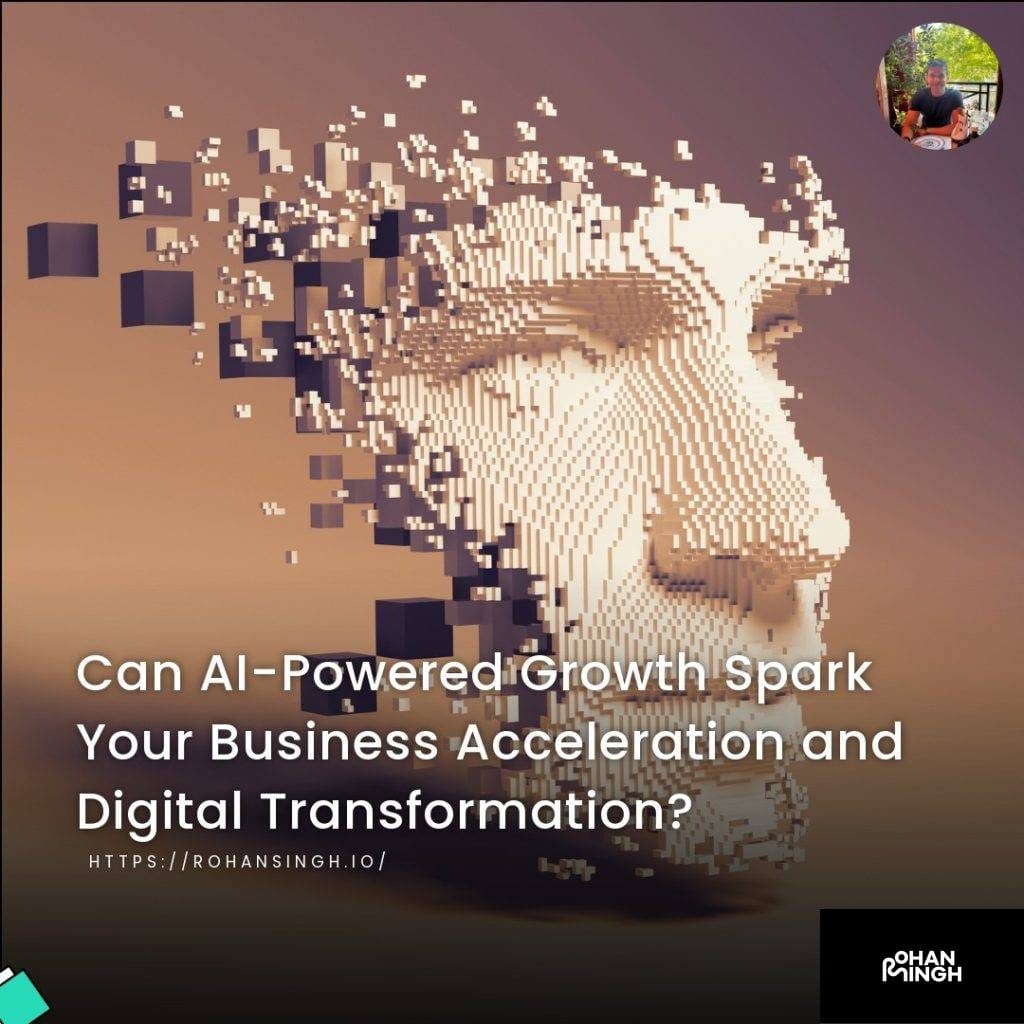Can AI-Powered Growth Spark Your Business Acceleration and Digital Transformation?

Definition of Artificial Intelligence
Artificial Intelligence (AI) refers to the simulation of human intelligence in machines that are programmed to think, learn, and problem-solve like humans. AI enables computer systems to process vast amounts of data, recognize patterns, make decisions, and carry out tasks with minimal human interference. By leveraging advanced algorithms and computational power, AI has the potential to revolutionize various industries and accelerate business growth. Organizations are increasingly adopting AI technologies and tools to automate and improve business processes, gain competitive advantage, enhance customer experiences, and drive digital transformation initiatives. AI-powered growth empowers businesses to harness the power of digital technology and data-driven decisions, enabling them to streamline operations, uncover actionable insights, and better meet customer expectations in today’s fast-paced, data-centric business landscape. With AI’s capabilities in predictive analytics, natural language processing, and machine learning, businesses can unlock a wide range of opportunities and drive exceptional customer experiences, while reducing human errors and optimizing internal processes. AI-powered growth has a positive impact on business growth and digital transformation journeys, enabling organizations to stay ahead of the curve and thrive in the digital business landscape.
Table of Contents
ToggleAI and Business Growth
Artificial Intelligence (AI) has revolutionized the way businesses operate, enabling exponential growth and driving digital transformation across all industries. The impact of AI on business growth cannot be understated, as it enhances flexibility, enables the adoption of a customer-centric approach, and facilitates significant changes across all business areas.
One of the key advantages of AI is its ability to provide businesses with the flexibility necessary to adapt to changing market dynamics. AI-powered tools and applications enable organizations to automate repetitive tasks, freeing up employees’ time and allowing them to focus on more strategic activities. This shift in operations has the potential to significantly improve productivity and efficiency, ultimately contributing to business growth.
Moreover, the adoption of a customer-centric approach is crucial in today’s competitive landscape. AI enables businesses to gain deep insights into customer behavior, preferences, and expectations. By analyzing vast amounts of data using predictive analytics and natural language processing, AI empowers businesses to tailor their products, services, and marketing efforts to meet customer needs effectively. This enhanced customer experience boosts customer satisfaction, loyalty, and ultimately drives business growth.
The statistics speak for themselves. According to a survey conducted by Gartner, by 2022, 70% of customer interactions will involve emerging technologies such as AI. Additionally, a study by McKinsey reveals that 55% of companies have adopted AI in at least one business function, with marketing being one of the prominent areas. This increasing use of AI in marketing exemplifies its potential to revolutionize business growth.
In conclusion, AI has a transformative impact on business growth. Its flexibility, customer-centric approach, and ability to drive significant changes across all business areas make it an indispensable tool for organizations seeking to accelerate their digital transformation journey. Embracing AI-powered growth is no longer an option but a necessity for businesses aiming to thrive in an increasingly digital world.
Let's talk about your future project!
Eager to collaborate on your upcoming endeavor? Let's explore and ignite the potential of your next big idea, shaping a promising future together!
AI and Digital Transformation
Artificial Intelligence (AI) has emerged as a game-changer for businesses, enabling digital transformation by revolutionizing processes, enhancing customer experiences, and driving business growth. By harnessing the power of AI, businesses can unlock opportunities for increased productivity, improved efficiency, and better customer understanding while mitigating risks.
AI-powered tools and applications automate repetitive and manual tasks, freeing up valuable time for employees to focus on more strategic activities. This shift in operations leads to enhanced productivity and efficiency, ultimately driving business growth. With AI-driven processes, businesses can streamline complex operations, optimize resource allocation, and make data-driven decisions, leading to improved operational effectiveness.
Furthermore, AI equips businesses with a 360-degree view of their customers – their behavior, preferences, and expectations. By analyzing vast amounts of data using predictive analytics and natural language processing, AI empowers businesses to tailor products, services, and marketing efforts to meet customer needs effectively. This deep understanding of customers enables businesses to create personalized experiences, fostering customer loyalty and driving business growth.
Statistics reinforce the transformative impact of AI. A Gartner survey predicts that by 2022, 70% of customer interactions will involve emerging technologies like AI. Moreover, according to McKinsey, 55% of companies have already adopted AI in at least one business function, highlighting its growing significance. AI-powered Growth is becoming a key competitive advantage for businesses, allowing them to stay ahead in the digital transformation journey.
In conclusion, AI’s ability to enhance productivity, efficiency, customer understanding, and risk mitigation makes it a vital component in accelerating business growth and digital transformation. By embracing AI-powered tools and strategies, businesses can create exceptional customer experiences, make data-driven decisions, and gain a competitive edge in the digital business landscape.

Benefits of Artificial Intelligence
Artificial Intelligence (AI) offers numerous benefits that can accelerate business growth and drive digital transformations. By leveraging AI-powered tools and applications, businesses can automate repetitive and manual tasks, enabling employees to focus on more strategic activities and increasing productivity. This shift in operations leads to enhanced efficiency and effectiveness, ultimately contributing to business growth. AI also allows businesses to streamline and optimize complex processes, making data-driven decisions and allocating resources more effectively. Additionally, AI equips businesses with a deeper understanding of their customers, their preferences, behaviors, and expectations. By analyzing vast amounts of data using AI-powered analytics, businesses can personalize experiences, foster customer loyalty, and create exceptional customer satisfaction. According to Gartner, by 2022, AI is predicted to be involved in 70% of customer interactions, highlighting its growing significance. McKinsey also reports that 55% of companies have adopted AI in at least one business function. The transformative impact of AI is becoming a key competitive advantage for businesses, allowing them to stay ahead in their digital transformation initiatives and drive AI-powered growth.
Automation and Efficiency
Automation and artificial intelligence (AI) have revolutionized business processes, accelerating growth and enhancing efficiency. Automation involves using technology to streamline repetitive tasks and eliminate manual errors, saving time and resources. On the other hand, AI goes beyond automation by incorporating machine learning and deep learning algorithms to enable systems to make intelligent decisions and improve performance over time.
By leveraging AI-powered automation, businesses can achieve heightened efficiency in their operations. Machine learning algorithms allow AI systems to analyze large volumes of data, identify patterns, and make accurate predictions. This capability enables businesses to automate complex tasks that were previously time-consuming and error-prone. Additionally, AI can continuously learn from new data and adapt its actions accordingly, leading to improved efficiency over time.
One of the key benefits of AI-powered automation is its ability to provide actionable insights through advanced analytics. AI can analyze vast amounts of data from various sources, allowing businesses to make data-driven decisions and gain a competitive edge. This level of analysis goes beyond what humans are capable of, providing deeper insights and uncovering hidden opportunities for growth. By implementing AI-powered analytics, businesses can also reduce reconfiguration and upgrade costs, as AI systems can adapt to changing circumstances without significant manual intervention.
Furthermore, AI-powered automation enables remote employee access to updated tools and processes. With AI, employees can access real-time data and insights through digital platforms, increasing productivity and facilitating collaboration, even when working remotely. This flexibility enhances business resilience and enables organizations to adapt quickly to changing market conditions.
In conclusion, AI-powered automation offers a significant opportunity for businesses to enhance efficiency and accelerate growth. By incorporating machine learning algorithms and advanced analytics, businesses can streamline processes, make informed decisions, and gain a competitive advantage in today’s digital landscape.
Predictive Analytics and Forecasting
Artificial intelligence (AI) has revolutionized the way businesses operate, enabling them to leverage advanced technologies to drive growth and digital transformation. One powerful application of AI in business is predictive analytics and forecasting. By harnessing the power of AI, businesses can gain valuable insights into buyer preferences, behaviors, trends, and interests, allowing them to create targeted marketing strategies and reach customers at the right time and through the right channels.
Predictive analytics leverages AI algorithms to analyze large volumes of data and identify patterns and trends. This analysis enables businesses to forecast future outcomes and make data-driven predictions. With AI-powered predictive analytics, businesses can understand customer behavior, anticipate their needs, and tailor marketing campaigns accordingly.
By integrating AI-powered analytics into their marketing strategies, businesses can achieve a deeper understanding of their customers’ preferences and interests. This empowers them to create personalized and targeted marketing messages and offers that resonate with their audience, leading to higher conversion rates and increased customer satisfaction.
Moreover, AI-powered predictive analytics enables businesses to optimize their marketing spend by identifying the most effective channels and campaigns. By analyzing historical data, AI can uncover patterns and trends that help identify the most impactful marketing initiatives. This not only maximizes the return on investment but also minimizes wasted resources on ineffective strategies.
To achieve this, businesses can leverage AI-powered tools and applications, such as customer analytics platforms and AI-driven marketing automation software. These tools provide businesses with real-time insights and predictive capabilities, enabling them to make informed decisions and execute marketing campaigns that drive growth.
In conclusion, AI-powered predictive analytics and forecasting have become essential tools for businesses seeking accelerated growth and digital transformation. By leveraging the power of AI, businesses can gain detailed insights into buyer preferences and behaviors and create targeted marketing strategies that effectively reach their target audience. This enables businesses to stay ahead of the competition, increase customer satisfaction, and drive business growth in the digital era.

Improved Customer Experiences
Artificial intelligence (AI) has transformed the way businesses interact with their customers, leading to improved customer experiences and heightened satisfaction. AI-powered technologies such as chatbots and virtual agents play a crucial role in enhancing these experiences.
By leveraging AI, businesses can provide personalized recommendations to customers, ensuring that they receive tailored content and offerings. Through machine learning algorithms, AI systems analyze customer data to identify patterns and preferences, enabling businesses to offer relevant recommendations. This personalization enhances the customer journey, increasing engagement and driving conversions.
Furthermore, AI-powered chatbots and virtual agents excel in answering frequently asked questions and resolving customer inquiries in a timely manner. These automated systems simulate human-like conversations, offering quick and accurate responses to customer needs. This reduces the need for human intervention, allowing businesses to handle high volumes of customer interactions efficiently.
The benefits of using AI to improve customer experiences are substantial. By providing personalized recommendations and quick answers to inquiries, businesses can greatly enhance customer satisfaction and foster loyalty. Satisfied customers are more likely to become repeat buyers and advocates for the brand, leading to increased revenue and growth.
To achieve these benefits, businesses can utilize AI-powered tools such as chatbot platforms and virtual agent software. These tools leverage natural language processing and machine learning to deliver exceptional customer experiences and streamline customer service interactions.
In conclusion, AI-powered technologies have revolutionized customer experiences by providing personalized recommendations, answering frequently asked questions, and offering quick responses. Incorporating these tools into business strategies not only improves customer satisfaction but also drives growth and fosters long-term customer loyalty. Experience the power of AI-powered growth in your customer interactions with these advanced tools and solutions.
Optimized Business Processes
AI-powered growth is transforming the way businesses optimize their processes, leading to accelerated business growth and digital transformation. By leveraging AI-based demand forecasting models, businesses can accurately predict customer demand and optimize their supply chain management. These models analyze historical data, market trends, and external factors to generate accurate demand forecasts. This enables businesses to optimize their production and inventory levels, reducing costs associated with overstocking or stockouts.
Additionally, AI can optimize business processes through processing optimization. AI algorithms, such as robotic process automation (RPA), can automate repetitive and manual tasks, improving efficiency and reducing errors. This allows employees to focus on more strategic and complex tasks, enhancing overall productivity.
Predictive maintenance is another AI application that can optimize business processes. By analyzing sensor data and historical maintenance records, AI systems can predict when machinery or equipment is likely to fail. This proactive approach allows businesses to schedule maintenance activities at the right time, reducing unexpected breakdowns and minimizing downtime.
According to the McKinsey State of AI in 2021 survey, adopting AI initiatives can help businesses reduce expenses by up to 20% while increasing revenue by up to 30%. This highlights the significant potential for AI-powered growth in optimizing business processes.
To fully harness the benefits of AI, businesses must redefine organizational responsibilities and roles. This includes training staff with new tools and security practices, ensuring that AI initiatives align with ethical standards and regulations. Establishing clear standards, rules, and processes for AI practitioners and data scientists is crucial to ensure transparency, accountability, and effective governance.
By embracing AI-based demand forecasting, processing optimization, and predictive maintenance, businesses can streamline their operations, reduce costs, increase revenue, and ultimately achieve optimized business processes and accelerated growth.
Continued Learning and Humanization
Continued learning and humanization are crucial elements in implementing artificial intelligence (AI) for business growth and digital transformation strategies. AI-powered systems have the unique ability to continually learn and adapt to new information and experiences, equipping businesses to stay ahead in an ever-evolving digital landscape.
With AI, businesses can tap into the power of continued learning. AI algorithms, such as machine learning and deep learning, can analyze large volumes of data and uncover patterns and insights that humans might miss. This ongoing learning process enables businesses to make data-driven decisions, adapt their strategies, and optimize their operations for better outcomes.
Furthermore, AI can humanize interactions by providing personalized experiences. AI-powered tools and applications can understand customer needs, preferences, and behaviors through techniques like natural language processing and predictive analytics. Businesses can utilize this knowledge to tailor their products, services, and marketing messages to individual customers, fostering stronger connections and enhancing customer satisfaction and loyalty.
AI-powered growth is not just about streamlining operations or automating tasks; it is about creating meaningful and relevant experiences for customers. By combining continued learning and humanization, businesses can leverage AI to deliver exceptional customer experiences, adapt to changing market dynamics, and gain a competitive edge in the digital realm.

Challenges of Implementing Artificial Intelligence
Implementing artificial intelligence (AI) in business operations is a powerful way to drive growth and digital transformation. AI-powered tools and applications can revolutionize customer experiences, streamline business processes, and provide deep insights for strategic decision-making. However, it is important to recognize that there are challenges that organizations face when implementing AI. In this article, we will explore some of these challenges and discuss strategies to overcome them, ultimately maximizing the potential of AI-powered growth.
1. Data Accessibility and Quality:
One of the key challenges in implementing AI is ensuring access to vast amounts of high-quality data. AI algorithms rely on large and diverse data sets to learn and generate accurate insights. However, many organizations face difficulties in collecting, organizing, and structuring their data in a way that is usable for AI processes. To overcome this challenge, businesses should invest in data management and governance frameworks, utilize AI-powered data analytics tools to automate data cleaning and enrichment processes, and establish partnerships with external data providers to access broader data sets.
2. Lack of AI Expertise:
Another challenge is the lack of AI expertise within organizations. AI implementation requires specialized skills and knowledge in areas such as machine learning, deep learning, and natural language processing. Many companies struggle to find and hire qualified AI professionals. To address this, organizations can invest in training programs for their existing employees, partner with academic institutions or AI consulting firms, or leverage AI platforms that offer pre-built models and easy-to-use interfaces, requiring minimal technical expertise.
3. Ethical and Regulatory Considerations:
As AI technology advances, ethical and regulatory considerations become increasingly important. Organizations must navigate issues such as data privacy and security, algorithmic fairness, and transparent decision-making. It is crucial to establish robust ethical frameworks and guidelines, conduct regular audits of AI systems, and ensure responsible use of AI-powered technologies. Compliance with relevant laws and regulations, such as the General Data Protection Regulation (GDPR), is essential to maintain the trust of customers and stakeholders.
4. Change Management and Cultural Shift:
Implementing AI-powered processes often requires a cultural shift within an organization. Resistance to change and fear of job displacement can hinder successful adoption. It is crucial to involve employees in the transformation journey, communicate the benefits of AI, and demonstrate how it can enhance their work by automating repetitive tasks, providing actionable insights, and improving decision-making. Leaders must foster a culture of continuous learning, encourage experimentation, and provide opportunities for upskilling and reskilling.
In conclusion, while implementing AI presents challenges, organizations can overcome them by addressing data accessibility and quality, investing in AI expertise, establishing ethical and regulatory frameworks, and managing change effectively. By leveraging AI-powered growth strategies, businesses can unlock new opportunities, improve operational efficiency, and deliver exceptional customer experiences.
Cost Considerations
When it comes to implementing artificial intelligence (AI) for business growth and digital transformation, cost considerations play a crucial role. While AI can bring about significant financial benefits, it is essential to evaluate the potential costs involved in order to ensure a cost-efficient implementation.
One of the primary advantages of AI-powered growth is its potential to reduce costs. By automating repetitive tasks and streamlining business processes, organizations can save time and resources. According to a report by McKinsey, AI applications have the potential to automate around 45% of repetitive tasks, leading to substantial cost reduction.
Furthermore, AI-powered analytics can provide organizations with actionable insights that enable data-driven decision-making, ultimately driving business growth. By leveraging AI algorithms and machine learning techniques, companies can optimize their operations and identify areas for improvement, thereby increasing revenue.
To ensure cost-efficient AI implementation, organizations can adopt wireless-first strategies. By embracing wireless connectivity and leveraging cloud-enabled architecture, businesses can reduce infrastructure costs while providing flexible and scalable solutions. This approach allows organizations to access AI tools and applications remotely, reducing the need for expensive on-premises infrastructure.
Additionally, AI-powered analytics can significantly reduce expenses by eliminating the need for manual data analysis and reporting. With AI algorithms, organizations can automate data processing and gain real-time insights, enabling more efficient resource allocation and cost management.
In conclusion, implementing AI for business growth and digital transformation requires careful consideration of costs. By identifying opportunities for cost reduction, embracing wireless-first strategies, and leveraging AI-powered analytics, organizations can achieve cost-efficient AI implementation while driving revenue growth.
Security Concerns
Security concerns are a crucial aspect to consider in the digital transformation process, especially when dealing with sensitive data. As organizations increasingly rely on digital technology and AI-powered processes to achieve growth, ensuring robust cybersecurity measures becomes imperative.
One way artificial intelligence can enhance security is through its ability to analyze behavior patterns. AI tools can detect anomalies and identify potential threats by monitoring user behavior and network activities. By establishing baseline patterns, AI algorithms can quickly identify signs of tampering, fraud, or breaches, allowing organizations to take prompt action to mitigate risks.
Furthermore, AI-powered analytics can provide organizations with comprehensive insights into their security posture. By leveraging machine learning techniques, AI tools can analyze vast amounts of data in real-time, uncovering patterns and indicators of cyberattacks. This enables proactive threat intelligence and the ability to preemptively address vulnerabilities.
Investing in AI-powered security solutions not only helps organizations protect sensitive data but also bolsters their overall digital transformation strategy. By leveraging advanced AI tools and applications, businesses can enhance their cybersecurity posture, ensuring a safe and secure environment for their digital initiatives.
With the continually evolving threat landscape, addressing security concerns through the adoption of AI-powered technologies is essential for organizations looking to accelerate their digital transformation journey.

Data Availability & Quality
Data availability and quality play a crucial role in the successful implementation of artificial intelligence (AI) for business growth and digital transformation. AI-powered growth relies heavily on the collection, analysis, and interpretation of data to drive informed decision-making and enable organizations to stay ahead of the competition.
Having access to a wide range of data is essential for training AI algorithms and models. The more data available, the better the AI system can understand patterns, make accurate predictions, and generate actionable insights. Data availability allows businesses to leverage AI capabilities to automate repetitive tasks, optimize business processes, and unlock new opportunities for growth.
However, data quality is equally important. Poor-quality data can lead to inaccurate predictions and flawed insights, which can negatively impact decision-making and hinder business growth. To ensure data quality, organizations need proper software and policies in place to filter and manage large amounts of data. This involves implementing robust data governance practices, data validation procedures, and data cleaning techniques.
By maintaining high-quality data, organizations can make more accurate predictions and decisions, enabling them to take advantage of AI systems effectively. With accurate insights, organizations can identify trends, customer behavior patterns, and emerging opportunities, allowing them to tailor their strategies and offerings to meet customer expectations. This, in turn, accelerates business growth and facilitates successful digital transformation initiatives.
In conclusion, data availability and quality are vital components of AI-powered growth and digital transformation. By ensuring access to a wide range of high-quality data, businesses can leverage AI capabilities to make data-driven decisions, improve customer experiences, and gain a competitive edge in the digital landscape.
Resistance to Change
Implementing artificial intelligence (AI) in business growth and digital transformation strategies can be met with resistance from organizations. This resistance to change can stem from various factors and hinder the successful adoption of AI technologies and processes.
One major factor contributing to resistance is the fear of job displacement. Many employees may worry that AI will replace their roles and render them redundant. However, studies have shown that AI technology actually complements human capabilities and allows employees to focus on more complex tasks that require human intuition and creativity. Communicating the value of AI as a tool to enhance productivity and efficiency can help alleviate these concerns.
Cost considerations also play a significant role in resistance to change. Implementing AI-powered growth strategies often requires a significant investment in acquiring the right technology, training employees, and integrating AI systems into existing processes. Organizations need to carefully assess the costs and benefits of AI implementation to address these concerns and make informed decisions.
Security concerns are another barrier to AI adoption. Organizations may worry about the potential risks associated with AI and the protection of sensitive data. Implementing robust security measures and utilizing AI-powered tools for data protection can help mitigate these concerns and build trust in AI technologies.
Lastly, the availability and quality of data are crucial in driving AI-powered growth. Organizations may face challenges in accessing and managing relevant data sources. Investing in data collection and management tools, such as AI-powered analytics platforms, can enable organizations to leverage the full potential of AI and make data-driven decisions.
Overcoming resistance to change requires a multi-faceted approach that addresses the concerns of employees, considers costs, ensures data security, and invests in the right technology. Organizations that successfully navigate these challenges and embrace AI-powered growth strategies will gain a competitive advantage and accelerate their digital transformation journey.
Invest in the Right Technology
In today’s digital age, small businesses need to leverage the power of technology to stay competitive and drive growth. Implementing the right technology is crucial for successful digital transformation, enabling businesses to optimize their operational processes and unlock new opportunities. However, with a wide range of technologies available, it is essential to identify the ones that align with your business goals and provide the most significant impact.
When selecting technology for your digital transformation journey, there are several key factors to consider. Firstly, compatibility is crucial. The chosen technology should seamlessly integrate with your existing systems and infrastructure, reducing disruption and enabling a smooth transition. Additionally, it’s important to evaluate the scalability of the technology. As your business grows, the technology must be able to accommodate increasing demands and handle larger volumes of data.
Another factor to consider is the level of support available. Investing in technology that comes with robust customer support ensures that you have the necessary resources and assistance to address any issues or challenges that may arise. This support can range from technical support to comprehensive training programs, enabling your employees to effectively utilize the technology for maximum benefit.
By investing in the right technology, small businesses can accelerate their digital transformation initiatives and unlock new avenues for growth. Whether it’s implementing AI-powered processes to automate repetitive tasks or leveraging predictive analytics for data-driven decisions, the strategic use of technology provides small businesses with a competitive advantage in today’s digital landscape. Embracing technology as a catalyst for growth can help small businesses stay ahead of the curve, drive customer satisfaction, and achieve long-term success. So, make the right technology investment and propel your digital transformation journey towards success.

Conclusion
In conclusion, artificial intelligence (AI) has emerged as a powerful tool for accelerating business growth and driving digital transformation. By harnessing the capabilities of AI-powered solutions, businesses can gain a competitive advantage, enhance customer experiences, and make data-driven decisions.
The benefits of AI in business growth and digital transformation are vast. AI can automate repetitive tasks, streamline business processes, and provide predictive analytics for more efficient and effective operations. It enables businesses to gain deeper insights into customer behavior, improve customer satisfaction, and create exceptional customer experiences. AI-powered analytics can uncover actionable insights from large volumes of data, empowering businesses to make better-informed decisions. Moreover, AI eliminates human errors and enables businesses to achieve a 360-degree view of their operations and customers.
However, implementing AI technology may come with challenges. It is crucial to invest in the right technology that aligns with your business goals and provides the most significant impact. Compatibility with existing systems and scalability are key considerations. Additionally, businesses should ensure they have access to robust customer support and training programs to maximize the benefits of AI.
In today’s digital era, investing in AI-powered growth is essential for businesses looking to stay competitive and thrive. By embracing AI and leveraging its capabilities, businesses can transform their internal processes, create competitive advantages, and unlock new opportunities for growth in the digital landscape.
FAQ's
1. What is the role of AI in business growth and digital transformation?
AI plays a crucial role in business growth and digital transformation by streamlining operations, automating processes, and enhancing customer experiences. It enables businesses to make data-driven decisions, optimize their processes, and gain a competitive advantage in the market.
2. How does AI help in streamlining operations and automating processes?
AI can automate repetitive tasks and manual processes, allowing businesses to allocate resources more efficiently and focus on more complex tasks. It can also improve efficiency by reducing human errors and providing real-time insights to optimize operational activities.
3. What are the benefits of using AI for predictive analytics?
AI-powered predictive analytics enables businesses to forecast trends, identify patterns, and make proactive decisions. It can help optimize inventory management, anticipate customer demand, and improve overall operational efficiency.
4. How does AI enhance customer experiences?
AI technologies such as natural language processing and machine learning enable businesses to understand customer behavior, preferences, and expectations. This allows for personalized interactions, tailored recommendations, and improved customer satisfaction. AI-powered chatbots also provide round-the-clock support, ensuring exceptional customer experiences.
5. How does AI increase worker productivity?
AI-powered tools and applications simplify and automate routine tasks, freeing up time for employees to focus on more complex and strategic activities. By leveraging AI, businesses can empower their workforce, drive innovation, and foster a culture of continuous improvement.
Similar articles about Acquisition Strategy:
Ready to Plan Your Dream Trip with ChatGPT Vacation Planner?, Want to Experience the Magic of Third-Party ChatGPT Plugins?, How can Efficient Project Management Boost Your Success?, Looking to Boost Your YouTube Views? Use ChatGPT for Top-Notch Video Optimization!
Are You Leveraging SEO Audits to Win More Clients?, Ever Thought of Starting an AI Career? Discover How Today!, Can SEO Propel Your Store to 1 Million Monthly Visitors?, How Can Google Bard Supercharge Your SEO Content Strategy?
Eager to Multiply Local Business Reviews from Travelers?, Which is the Best AI Chatbot? A Head-to-Head Comparison of ChatGPT, Claude 2, Bing Chat, and Google Bard, Want a Game-Changer in SEO? Have You Tried AI and Chrome Extensions Yet?,
Can AI-Powered Growth Spark Your Business Acceleration and Digital Transformation?, Ready to Achieve SEO Mastery and Stand Out in the Digital World?, Ready to Dominate the Future? How Can You Kickstart Your AI Data Science Career Today?, Want to Dominate Google SERP? Learn How to Supercharge Your Content Strategy!, Have You Explored the ChatGPT Android App Yet?
Ready to Supercharge Your Business? Harness the Power of Always-On PPC Strategy Now!
What Marketing Strategy Did Cheetos Employ for Plants vs. Zombies Collaboration?
Rohan Singh | May 1, 2024 | Acquisition What Marketing Strategy Did Cheetos Employ for Plants vs. Zombies Collaboration? Background on Cheetos Cheetos, a popular brand of cheese-flavored snacks, has made a name for itself with its bold and playful marketing strategies. Known for its irreverent and creative campaigns, Cheetos has consistently found unique ways […]
What Marketing Strategy Did Cheetos Employ for Plants vs. Zombies Collaboration?
Rohan Singh | May 1, 2024 | Acquisition What Marketing Strategy Did Cheetos Employ for Plants vs. Zombies Collaboration? Background on Cheetos Cheetos, a popular brand of cheese-flavored snacks, has made a name for itself with its bold and playful marketing strategies. Known for its irreverent and creative campaigns, Cheetos has consistently found unique ways […]
What Differentiates Differentiated Marketing Strategy from Undifferentiated?
Rohan Singh | April 30, 2024 | Acquisition What Differentiates Differentiated Marketing Strategy from Undifferentiated? Definition of Differentiated Marketing Strategy A differentiated marketing strategy is a targeted approach that focuses on creating unique products or services to meet the specific needs and preferences of different customer segments. It recognizes that customers have diverse tastes, preferences, […]
What Sets Apart the Marketing Concept from a Marketing Strategy?
Rohan Singh | April 29, 2024 | Acquisition What Sets Apart the Marketing Concept from a Marketing Strategy? Definition of Marketing Concept The marketing concept is a philosophy that places the customer at the center of all marketing activities. It focuses on understanding the needs and wants of the target market and delivering value to […]
Which promotional mix strategy targets market channel members?
Rohan Singh | April 28, 2024 | Acquisition Which promotional mix strategy targets market channel members? When it comes to promoting a product or service, companies utilize various strategies to reach their target audiences. One key strategy that directs marketing efforts toward market channel members is known as trade promotion. Trade promotion is a type […]
Should charter schools adopt regional or national marketing strategies?
Rohan Singh | April 27, 2024 | Acquisition Should charter schools adopt regional or national marketing strategies? Purpose When it comes to marketing strategy in the field of charter schools, two broad approaches can be taken: regional and national. Each approach has its purpose and benefits depending on the goals and aspirations of the charter […]
Topics :
Share :






